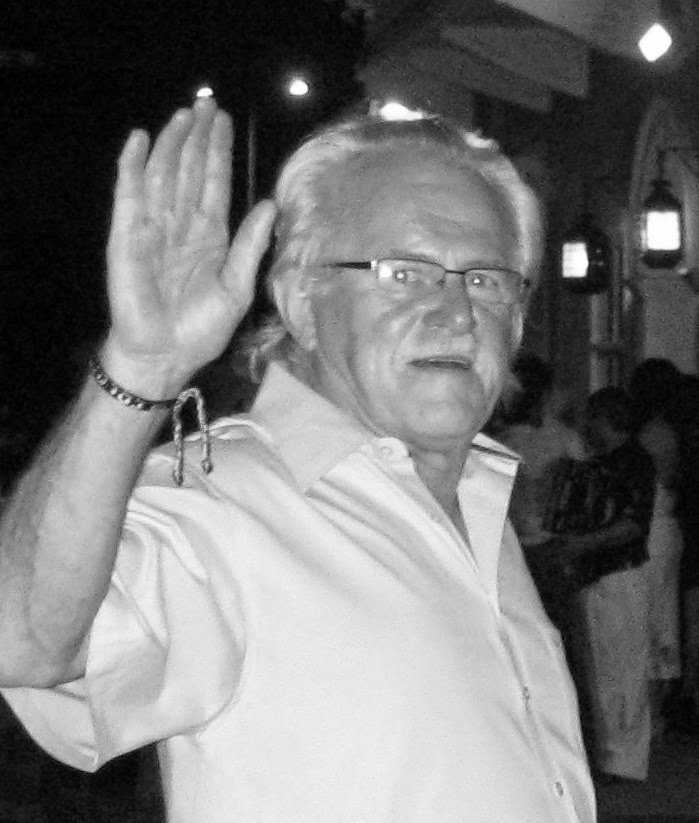Difficult to believe, that Eugene ‘Duke’ McCarron is no longer with us. For
me, it was always just a given that I could go into such-and-such a bar at
such-and-such a time and there would be the Duke holding court. In my view, he
was as much a part of Toronto
as the Royal York Hotel.
 |
| Younger days: The Duke, Simon, Paul, Me |
I met the Duke some 45 years ago and not once did we
exchange an angry word.
Due to my lengthy absences from Toronto , I sometimes wouldn’t see him for a
number of years. But when we did meet up, it was as if the two of us had been
quaffing ales just the night before.
From what I’ve heard, he went peacefully in his sleep while
vacationing in the Philippines .
Upon learning this, I remarked to a couple of friends, “I can only hope he
snuffed it whilst on the job.”
Well, at his wake I heard a whisper that this may have been
the case—well, almost—that a local young damsel may have visited his room
earlier on in the evening. All I can say is that I certainly hope so.
I drove down to Toronto
for the wake Friday before last. It was a brilliant event. Must have been over
two hundred of his friends there!
Some years back, I returned from a voyage and needed a place
to stay in Toronto .
Dukey had a spare room so I ended up staying at his place for a year or so.
One Friday night, after an obviously trying day at work, my
landlord arrived home a little peaked-looking—nothing like his usual self. It
must have been terrible day because he’d come straight home rather than
stopping at one of his watering holes.
In an attempt to cheer him up, I cracked a bottle of wine.
The contents perked him up sufficiently to warrant the uncorking of another. By
the time we got through this one, Dukey was back to normal. He went to his grog
cupboard and produced a third bottle.
Well, we lied and laughed our way through that one then Dukey
remembered he had another in the trunk of his car and went toddling off to
retrieve it. He was gone for some time—not long enough for me to go searching
for him, but longer than it should have taken him.
When he returned, his whole mood had changed—he seemed preoccupied
and had lost his recently regained spark.
Finally I managed to coax it out of him that he’d fallen
down the front steps. There were only about four of them, but they were
concrete, and on each side was a concrete ledge running down at an angle a
little above the steps. Apparently he’d gone plummeting over this
ledge—fortunately before he’d
retrieved the bottle from the car or we would have lost…errr…or he might have
cut himself on broken glass.
Well, I cracked the bottle and the two of us drank, but this
time, the wine didn’t shake the Duke out of his funk.
Then I noticed a pool of blood by his left foot. An
examination of his leg revealed a twelve inch gash down his shin, opened up to
reveal ten inches of bone!
One of the concrete ramps beside the steps had once had an
iron handrail set into it. Well, the thing had rusted off and left a few little
pointed nubs sticking out a couple of inches. It was one of those that had
nailed Dukey’s leg.
We discussed going to the hospital, but of course neither of
us was in a fit state to drive. And being Friday night, there were bound to be
numerous drink-related mishaps, meaning a lengthy wait in Emergency.
So I was forced to apply a field dressing. And what a beaut
it turned out to be! I first gave the wound a liberal splash of vodka (Dukey’s
home contained no other medicinal supplies) then tore up an old bed-sheet with
which I bound the injured limb. The dressing was then banded with duct tape to
secure it in place.
 |
| Bye Dukey |
Once the problem had been taken care of, the Duke perked up
considerably and we carried on as before. As I recall, when that last bottle of
wine had been demolished, we toasted the success of the operation with what
remained of the antiseptic.
Next day some thirty-five stitches were applied to the
wound. I was rather chuffed to hear that the attending doctor had a few good
words to say regarding my dressing.
Well, a month or so later, off I went on another voyage.
It was from somewhere in the Caribbean
I learned that Dukey had had a leg amputated. Oh, my God, I thought!
But as it turned out, it was not the one I’d attended to.








